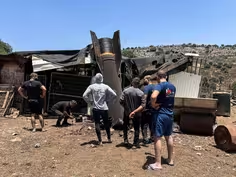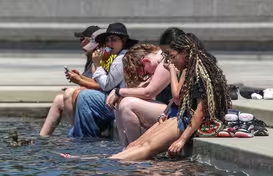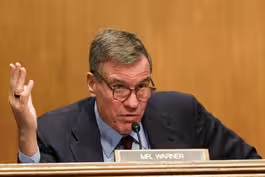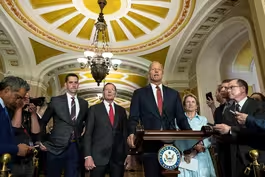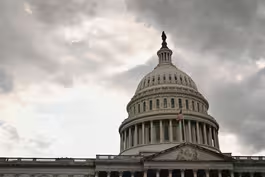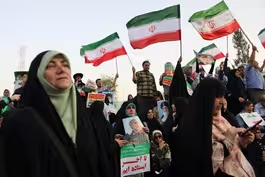
White House set to roll back national forest protections
Clip: 6/24/2025 | 6m 54sVideo has Closed Captions
White House set to roll back protections for nearly 60 million acres of national forests
The Trump administration is rolling back decades-old protections for nearly 60 million acres of National Forest. The rule had prevented logging, mining and road-building in designated areas across more than 40 states. The new changes would open those sites, about a third of national forest land, up for development. Geoff Bennett discussed more with Kirk Siegler of NPR.
Problems playing video? | Closed Captioning Feedback
Problems playing video? | Closed Captioning Feedback
Major corporate funding for the PBS News Hour is provided by BDO, BNSF, Consumer Cellular, American Cruise Lines, and Raymond James. Funding for the PBS NewsHour Weekend is provided by...

White House set to roll back national forest protections
Clip: 6/24/2025 | 6m 54sVideo has Closed Captions
The Trump administration is rolling back decades-old protections for nearly 60 million acres of National Forest. The rule had prevented logging, mining and road-building in designated areas across more than 40 states. The new changes would open those sites, about a third of national forest land, up for development. Geoff Bennett discussed more with Kirk Siegler of NPR.
Problems playing video? | Closed Captioning Feedback
How to Watch PBS News Hour
PBS News Hour is available to stream on pbs.org and the free PBS App, available on iPhone, Apple TV, Android TV, Android smartphones, Amazon Fire TV, Amazon Fire Tablet, Roku, Samsung Smart TV, and Vizio.
Providing Support for PBS.org
Learn Moreabout PBS online sponsorshipGEOFF BENNETT: The Trump administration is rolling back decades-old protections for nearly 60 million acres of national forest.
The so-called roadless rule had prevented logging, mining, and road building in designated areas across more than 40 states.
The new changes would open those sites -- it's about a third of national forestland -- up for development.
Environmental groups quickly denounced the plan, but the administration called the move common sense and said it would jump-start timber production and aid in fire prevention.
For more, we're joined now by Kirk Siegler, a national correspondent for NPR who covers the Western U.S. Kirk, it's great to see you.
So it was President Clinton in his final days in office who used his executive authority to protect tens of millions of acres of national forest.
Give us a sense.
How vast was the area that this rule covered, and what's at stake now if these protections are rolled back?
KIRK SIEGLER, National Correspondent, NPR: Well, this at the time was huge.
And it's interesting for those of us who have been covering public lands for so long.This issue had kind of gone away.
And then, suddenly, like a lot of things in the Trump administration, here it is back.
When President Clinton first signed it as he was leaving office, this was a huge decree of protections, we should say added protections, for national forestland across the country, largely across the West here and in Alaska.
And when he signed the decree, it, of course, then was litigated for years and years.
But I think, looking back on it, it's interesting to think that this really did set a precedent for future Democratic presidents anyway.
President Obama went on to use his pan and executive order to protect large national monuments in Utah and other states.
So, looking back on the roadless rule, it sure did lead to a lot more protections and a lot of controversy because, by federal law and traditionally, it's Congress that has to designate wilderness areas.
GEOFF BENNETT: And these forests that we're talking about, many of them are remote, they're hard to reach.
I mean, do you expect that we will see a surge in logging and mining and drilling and development?
KIRK SIEGLER: Well, this is a kind of hard question to answer right now, because, like anything, I kind of hate to compare it to say the onshoring of domestic manufacturing or that push to sort of bring logging back to places like the Pacific Northwest, where I'm talking to you.
This will take years.
And, as you say, a lot of these roadless areas are very remote.
They're also hard to reach, expensive to develop.
And it's not, in many cases, politically popular.
Looking at the Tongass National Forest in Alaska, this has been subject to controversy for years.
Closer to home, in the Pacific Northwest here, the Frank Church River of No Return and the adjacent -- roadless areas adjacent to that wilderness area in Central Idaho, just vast, these are places that aren't necessarily easily going to be developed.
And the timber industry has been pretty, I would say, curtailed, at least in the Pacific Northwest, recently in recent years, really since the '80s and '90s.
So it's very hard to imagine right now just immediately flipping a switch and saying these places are going to be logged, because a lot of the timber companies that are left have really moved to private land for a number of reasons.
GEOFF BENNETT: So, Kirk, you have been speaking with environmentalists and conservation groups as you have been reporting this story.
What are their main concerns?
KIRK SIEGLER: Well, they're saying that this is being done as part of -- under the guise of decreasing wildfire threats and getting in and doing more forest management and active forest management.
But they're pointing out that, or at least telling me, that, in a lot of the cases, the wildfire risk is more closer to cities here in the West where -- that are built out into the woods or directly adjacent.
And these roadless areas are far more remote and in areas that don't typically burn to the scale that we have been seeing in the large catastrophic fires in California, Hawaii and Colorado in recent years.
They also say that this has been basically ignoring two decades worth of a lot of public input in favor of this roadless rule being enacted.
There have been something on the order of about a dozen lawsuits since 2001 in the early aughts about this, and it's largely been considered settled.
The environmentalists are ready to sue again, though, so we will have to see exactly when and how this roadless rule gets reversed, but they seem to be eager to go to court again.
GEOFF BENNETT: Well, our team spoke with Scott Dane.
He's president of the American Loggers Council, and he makes the point that this logging can be done in a responsible fashion.
Take a listen.
SCOTT DANE, Executive Director, American Loggers Council: The loggers are actually the tool to allow forest managers, foresters to achieve their objectives and their prescriptions of addressing forest health.
And so what people think about logging from 50 years ago is not logging today.
We go in and we harvest timber based on civil cultural, science -- scientific practices.
Access to timber has been choked off, access to these national forestlands.
So opening those back up and supplying timber in these areas could go a long way in reducing the mill closures that we have seen across the country.
GEOFF BENNETT: So what should we know about the points that he made there?
KIRK SIEGLER: Well, I think you do hear that a lot from the timber industry that access has been cut off.
And, in fact, a lot of timber companies that I have reported on over the years, particularly in California, have started to move over to just doing business on private land, because U.S. Forest Service land carries a lot more restrictions with it, a lot more red tape, they will tell you.
And I think there's a signal from this administration that that's going away.
On the other hand, he mentioned there that there have been so many timber closures.
The kinds of logging that they're wanting to see by opening up these roadless areas and other places around the West -- President Trump signed an order saying he wants 25 percent more logging across the Forest Service in the next four or five years.
That kind of stuff that they're going to try to increase volumes, it's unclear whether or not there's enough infrastructure on the ground right now, particularly in the Northwest here, to actually be able to process all those logs.
So that kind of remains to be seen.
But, yes, the industry has been frustrated, I think, over the years, looking at the federal partners in a system that was sort of set up historically that the U.S. Forest Service land would feed basically the timber companies.
And that, of course, changed quite a bit with the advent of rampant environmentalism starting in the '60s and '70s.
GEOFF BENNETT: Kirk Siegler, national correspondent for NPR, thanks so much for sharing your reporting and insights with us.
KIRK SIEGLER: Glad to be here.
How proposed cuts to Medicaid could affect rural hospitals
Video has Closed Captions
Clip: 6/24/2025 | 4m 3s | How proposed cuts to Medicaid could affect rural hospitals (4m 3s)
Israel-Iran ceasefire holds as Trump lashes out at both
Video has Closed Captions
Clip: 6/24/2025 | 9m 39s | Fragile Israel-Iran ceasefire holds as Trump lashes out at both sides (9m 39s)
News Wrap: 160 million enduring brutal U.S. heatwave
Video has Closed Captions
Clip: 6/24/2025 | 4m 49s | News Wrap: 160 million enduring brutal conditions in U.S. heatwave (4m 49s)
Sen. Warner questions delay of Iran strike briefing
Video has Closed Captions
Clip: 6/24/2025 | 7m 17s | Sen. Warner questions administration's delay of Iran strike briefing (7m 17s)
Time running out for GOP to pass tax plan by Trump deadline
Video has Closed Captions
Clip: 6/24/2025 | 4m 38s | Time running out for GOP to pass massive tax and spending plan by Trump's deadline (4m 38s)
Trump's attempt to claw back funding, explained
Video has Closed Captions
Clip: 6/24/2025 | 7m 23s | Trump's attempt to claw back funding approved by Congress, explained (7m 23s)
What's next for Iran's regime? Analysts weigh in
Video has Closed Captions
Clip: 6/24/2025 | 7m 30s | What's next for Iran's regime after U.S. strikes and Israel ceasefire? Analysts weigh in (7m 30s)
Providing Support for PBS.org
Learn Moreabout PBS online sponsorshipSupport for PBS provided by:
Major corporate funding for the PBS News Hour is provided by BDO, BNSF, Consumer Cellular, American Cruise Lines, and Raymond James. Funding for the PBS NewsHour Weekend is provided by...

